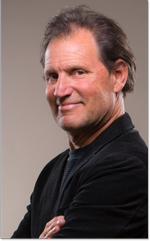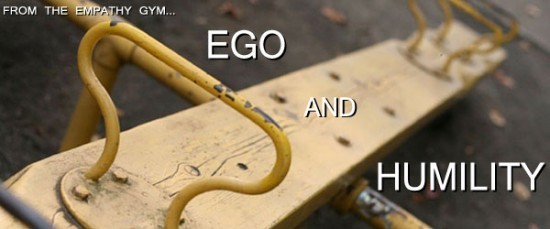
Bill English, Artistic Director
When San Francisco Playhouse moved from 533 Sutter to 450 Post, it was a Herculean undertaking, fraught with grave risks on all sides. I feared that though we had challenges with our Sutter Street landlord, we might have even more difficulties with our new landlord, the Elks. I feared that the Department of Building Inspection would reject our plan to convert the former 700-seat space to 200 seats. Mostly, I was terrified that no one would show up. We needed to literally double our audience size in order to cover the significant increase in expenses at the new space. In other words, I was scared.
Reflecting back on that time, I realize that I went into full battle mode. I toughened myself up and shut down a portion of my empathy capacity. I was tasked with the nearly impossible: to build an entirely new theater space and simultaneously mount an incredibly complex musical, Bloody Bloody Andrew Jackson, in only six weeks’ time. There was no time for second guessing; no margin for error, whatsoever. I had to make every decision and take every action with the utter conviction that I was right, that it would all work out, and that I was on a sacred mission from the artistic gods. I can see now that in my crazed drive for success, I trampled on a few folks, including people who were closest to me and whose help I needed most. I could justify my behavior with various excuses: this person dropped the ball; that person failed to listen to me properly. But that would be hogwash. The truth is that I empowered myself, for the sake of the Art, to belittle and marginalize several people around me.

Bloody Bloody Andrew Jackson at 450 Post
Professional theatre is an extraordinarily tough business. And like in many competitive fields, to succeed in the theater business, one needs great determination, confidence and the capacity for endless hard work in addition to talent. All of which requires an extremely well-developed sense of self. Or rather, a big ego. And as we all know, a strong ego is often accompanied by a host of unpleasant character traits: a refusal to admit one is wrong; a fiercely competitive inclination that overshadows basic forms of humanity and compassion; a my-way-or-the-highway syndrome; a tendency to belittle and even wish ill on the competition; an inability to accept constructive criticism.
This is the double-edged sword of the artistic temperament. As artists, we need to single-mindedly believe in our vision and relentlessly pursue excellence. We need ambitious goals driven from an urge to succeed that emanates from our very core. But at what cost? How do we balance the necessary ambition with our theater’s mission to promote compassion in the empathy gym, both on and off stage? How can we generate the requisite horsepower to move the train up the hill without crushing others beneath the wheels and leaving behind a wake of destruction?
These are the quandaries ambitious people face in every profession. Artistic ambition, however, often involves a special clouding of the mind that prevents us from observing when we let the desire for success overwhelm our humanity: the sense that we are serving a greater Artistic purpose than our mere mortal selves. We tell ourselves that the Art we struggle so hard to create will transform lives, strengthen the community, imbue wisdom to all who consume it. And we ardently believing that the Art will change the world for the better, we tell ourselves that such an end most surely justifies the means.
And this is what happened to me five years ago, when my ambition and drive for success with the move to the new theater blinded me to the effects of my behavior on those around me – the very people that I cared about and needed the most. Did I say I was sorry? Of course. Have I forgiven myself? Yes. I continually learn from such experiences so that I can grow as both a leader and as a human being. I can reflect on these kinds of situations to gain perspective and a sense of humility. Ultimately, the type of art we strive to create at San Francisco Playhouse requires a certain kind of humility. In order to be a true artistic collaboration, I must admit that I may be wrong. When I am directing a show, I must be open to the fact that an actor, designer, or stage manager may have a better idea than I do. I must remember that to inspire the best from an actor or designer, I must listen to them openly and create an environment of trust rather than an atmosphere of fear and criticism.
Humility comes from facing our short-comings and acknowledging our failures. Yes, we need strong egos to survive and succeed in the theatre. We must have confidence that we can succeed, or we would never even try. But I believe that genuine confidence comes from having the humility to admit that one individual does not have all the answers; that our greatest strength derives from empowering the ensemble to shoulder the load. Theatre is the ultimate social art. It requires every one of us – actors, director, designers, technicians, stage managers, house managers, concessions, box office, development, marketing, literary, education, accounting, and administration – to work together to the best of our abilities in order to successfully mount a great production. Instead of sacrificing our humanity, we need only sacrifice our ego for the greater good of the Art.
As always, I’d love to hear your thoughts. Please feel free to leave your comments below.
Best,

Bill




Incredible playhouse with some great plays….sets, acting and production is amazing!!!
Any Detroit trips? :))
Hi Bill,
That was a beautiful and gutsy post. Thanks so much for both your work with the theater (we were especially blown away by “The Nether”), and with your own work on your self. Both are apparent and appreciated.
Best wishes,
Marty
Beautifully written. I, too, used to be so driven and unaware of the impact my “passion for what I did” had on those around me. You explained very clearly this age old dilemma and it really put me in a deeply reflective mood….I am better now, I am much more aware of the feelings of those around me.
I dig these blog posts from you. They always make me think….”Loved City of Angels”
Now I know who the brainy one is, I’ll keep lokonig for your posts.
Bill,
You described so well the conflict all of of us face between ego and humility. I think it is the mark of a mature adult to reach a balance and feel good about that stasis. Your monthly reflections are an extra reward for us dedicated subscribers to the Playhouse.
See you in the gym,
Howard
Crisis management often separates people into three categories. Those who come apart at the seams, those who become helpless and paralyzed, and those who take charge, giving people very specific instructions about what they need to do and getting them moving. The added pressure of working in crisis mode often leads to a fraying of nerves, some stepping on toes, and the wounding of egos. Good leaders manage to get their team through the crisis and back into working order when the crisis has passed. When a cluster of large egos is involved, the temperature usually rises.
Having high artistic standards often makes it more difficult to keep everyone happy in tense situations. The company survived the transition, despite the pressures of the meeting the challenge. Think of the the move from 533 Sutter to 450 Post as a whitewater rafting trip with your own scenery. (Some day I should tell you about the trip I took down the Colorado River with members of the Portland Opera and a grand piano!)
One thing I think you don’t get enough credit for is the quality of your writing in these Empathy newsletters. Keep up the good work.
I live for your empathy gym emails; such transparency! I have been building a wellness business for 6 years and often struggle with the balance you spoke of – mainly how it relates to where my time goes. When business is in full force, often my closest friends and family become obligations and I don’t treat them with the love and humanity they so very much deserve. The greater good is definitely a justification; often I have to take a breath and remember the greater good begins with each and every individual and our own personal lives. Thank you so much for your Art, compassion, and commitment.
I run a few small businesses and I don’t think I’ve taken the time to read your blog before. I loved it. First of all you are doing brilliant work at this theater I’ve gone to this location since 1979 seeing many Eureka shows there, being introduced to Smuin Ballet ( no comment) and more. I have to re learn these lessons over and over when it comes to the bigger picture. Many thanks. You are a guy I’d live to have coffee with if we both weren’t so busy!
Your blog post and the thoughtful comments reflect the complexities of our human selves. I’m not schooled in such things but it seems to me that it is in these crises, these pressure points, that we have opportunities to observe and ideally embrace our dark side. My observation is that most people are good nearly all of the time: it is in those moments of crisis that they reveal their true natures.
Thank you, Bill, for the Empathy Gym and for your posts.